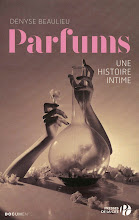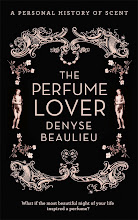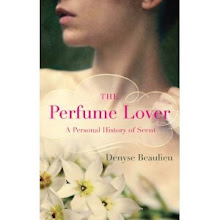LucGabriel’s open letter about the upcoming amendment to the upcoming EU Cosmetics
directive was so alarming – and alarmist – it prompted me to seek out facts
about what’s really going to happen. Here’s what I came up with after
discussing with my inside sources.
Main takeaway: there are no, repeat NO imminent
reformulations. And NO bans on naturals.
Will any
naturals be restricted?
Not for the
time being. The amendment that EU MPs will vote on next fall, to be implemented in
January 2015, will not enforce stricter regulations than current IFRA standards.
The only thing that will change is the number of substances that must be labeled: 89 instead of the current 26. Companies
will have two years to comply. How this will be carried out (will the
information be put on boxes, on websites?) remains to be determined.
Is anything
banned?
The only
three bans will concern HICC (Lyral) and two “oak moss molecules”, atranol and
chloroatranol. But oak and tree moss will NOT be banned, provided they have no
more than trace amounts of the incriminated molecules. Added: Obviously this will entail reformulations, especially for the huge quantity of products containing HICC, but again, companies will have two years to comply.
Are big labs really
pushing to replace naturals with their captive molecules?
That conspiracy theory doesn't hold up. If
they were, as many people including Luc Gabriel seem to believe, they’d be
shooting themselves in both kneecaps. They’ve all been investing millions into
buying or setting up natural ingredients branches, securing sustainable sources
and perfecting new methods or qualities of extraction. So they wouldn’t be likely
to be cackling and stroking their white Persian cats, supervillain-style, at
the perspective of severely restricted concentrations of naturals.
Labs would
also stand to lose if extensive reformulations were required. Clients don’t pay
a cent for them, which means perfumers have to spend countless hours tweaking
formulas rather than coming up with new ones to compete for briefs.
What caused
the panic?
The opinion
paper put out by the SCCS (Scientific Committee on Consumer Safety) that raised
so much alarm was, in fact, a bid to get the industry to react. In the ten
years since the European Cosmetics directive was implemented, IFRA hadn’t done much about providing better tools to assess allergenic
risks in fragrance materials. EU boffins decided to put the fear of God into it
by proposing extreme measures. But as a pharmacologist working in regulatory
affairs for a government agency commented to me after reading this opinion
paper: “The science in there is medieval”.
What’s
happening now?
IDEA
(International Dialogue for the Evaluation of Allergens), a work group of stakeholders
including scientists from different fields (dermatologists, toxicologists, immunologists, computational
modelers, etc.), has been put together at IFRA’s initiative to determine more
robust methodologies to assess the risks of fragrance ingredients, based on
real-life exposure, not only for allergies but for genotoxicity, reprotoxicity, etc. This approach will be valid not only in Europe, but
worldwide.
Will
authorized concentrations be one-size-fits-all?
No, the SCCS proposal is
off the agenda. Each ingredient on the “hit list” will be analyzed according to
the methodology determined by IDEA. Some materials might even have higher
authorized concentrations than previously. At this stage it is the methodology that
is under discussion: it is impossible to evaluate how long it will take to get
results.
How will
these concentrations be determined?
While the
SCCS opinion paper proposed limiting concentrations based on whether they
elicited allergic reactions in people who are already allergic, the methodology all stakeholders have agreed on
developing will be based on the level required for inducing allergies in people who were not allergic previously. In the first, worst-case-scenario, many
fragrance materials would have indeed been so restricted that it would have
been useless to even make perfume. In the second, accepted scenario,
concentrations can be higher.
How can I write to the EU to express my concerns?
You can consult this web page and write to this address:





 L'actu
L'actu 


Some comments in English have ended up on the French version of this post, please consult them as they make very interesting points.
RépondreSupprimer1. concerning allergens : before we had 26 allergens, tomorrow 89, in 10 years 250 etc etc : I have read that statistics show that only 3% of world population is allergic !
Supprimer2. Essential Oil are not so restricted now, but for how long time ? SCCS was trying to include more essential oil in the "ban" basket; they failed this time, but they will try again
3. when fragrance will smell like water, they will be happy, then they will act to ban Milk , because this ingredient is also very dangerous !
Fragrance lovers are understandably upset, like you are, but that won't make the problem go away. It seems like a better strategy to engage with regulators, which is what is happening now.
SupprimerDear Denyse,
RépondreSupprimerThank you for this highly interesting read.
If the SCCS's recommendation are indeed off the table and the new approach to risk assessment according to IDEA, then this amendment can actually be seen improvement in some areas. Will the re-assessment of thresholds include prohibitions as well or only relate to limits for obligatory labelling?
Best, Angelika
I don't think your question can be answered before the different ingredients have been assessed. Could go one way or another since the methodology is meant to be much more robust than the ones used in the studies referenced by the SCCS.
SupprimerThanks Denyse! Great explaination, single handly calming the game down. Tks again.
RépondreSupprimerMy pleasure, Christopher!
RépondreSupprimerTheories are theories. Great to learn of the natural ingredient initiatives by the big companies. Not new news I guess but overtaken by the captive molecule concerns. A great investment which they are invested to protect. Thank you for this report in the middle of ski season. A very nice salome you have Denyse through all the pertinent points.
RépondreSupprimerI don't ski so, no sacrifice...
Supprimerthanks for the update!
RépondreSupprimercheers,
minette
Thank you Carmen for your informations.
RépondreSupprimerBut, they will not stop. Are improving the method to arrive at their goals:
1) replace the chemical flavorings to the natural oils
2) make it too much difficult and too much expensive to produce perfumes for small producers.
Good things ,
geco.
Geco, I think I answered your first point in this post. As for your second point, it might indeed become more difficult for smaller ingredients companies to produce EU-compliant natural extracts if they need to invest large budgets to carry out analyses on them, or to develop naturals devoid of allergenic molecules. But that is speculation for the moment, as the 20 ingredients pinpointed by the SCCS report have yet to be tested.
RépondreSupprimerThank you for the update and explanations.
RépondreSupprimerThank you Denyse - I am feeling very relieved after reading your comments.
RépondreSupprimerThank you, I feel a relief... But the regulations regarding allergy hazard seem to me still exagerated... How many people on earth have allergies to natural ingredients?
RépondreSupprimerAnd how many to different synthetics....?
Well, a fair way would be to list the allergenes, to give with any perfume a leaflet as for medicines/drugs at the chemist' and people can read the leaflet-terms of use- alergenes- hazard- sympthoms- etc and use the perfumes on their own responsability.
I agree to receive a form.... : yes, I read and I agree to terms of Perfume Use, yes, I accept to use it on my own risk, yes, I sign for it. Give me my perfume, please.
Gentiana
Gentiana, the figures given are 1 to 3% of the population in Europe.
SupprimerI would support consumer information: rather than a leaflet, it would be more efficient to post it online, where consumers could interact with the brand.
But I can also see how this would be an issue for brands: perfumes are associated with beauty and luxury, not with medication, and while listing potential adverse effects would work for perfume lovers, the general public might be put off... Mind you, we all click on Terms of use without reading them when we download software!
Yes, you are right, perfumes ARE luxury, but if some ingredients could be saved from banning in this way... Extreme situations may require extreme solutions.
RépondreSupprimerMy idea was maybe eccentric - in case if no other solutions are possible. Yes... perfume lovers cope with it. But the big money - that make live inclusive the niche and indie houses comes from people who are not necesarilly perfume lovers and (more or less) "conoisseurs", but people with big money that want something cool, rich, gorgeous, original... a story... anything that reinforces status.
And these peoples don't bother with Terms of Use, don't need complicated things.
Your idea to have them on internet is closer to how customer-friendly marketing would act.
Anyway, if the mass market decides to keep only the synthetic ingredients, there may appear two radically different perfume markets... Now I try to link your older post (with the over-harvesting of naturals just to have a small percentage in the thousands-barrels mass market perfumes)
I am not very good in writing, but I hope you got the idea.
Very good comparison to the IT issues, although we speak again about utilitary versus luxury. And yes, mostly we don't read the Terms of Use :).
You are right again :)
Gentiana
By some reason my Word Press Account doesn't work.
Excuses.
Gentiana, yes, I do get the idea -- I was an English teacher in another life and I always encouraged my (adult) students to push out of their comfort zone, it's the only way of learning!
SupprimerIt might be a good solution to create a specific status for perfume, based on various arguments I and a group of people are looking into... You're right about the clients who sustain the niche market, they far outnumber our little world of enthusiasts, and they wouldn't want to bother with terms of agreement!
I appreciate your article. You have a great sight for information and point of views. I often have to read thing 2-3 times because of the density of information and descriptions. Thank you for the efforts.
RépondreSupprimer